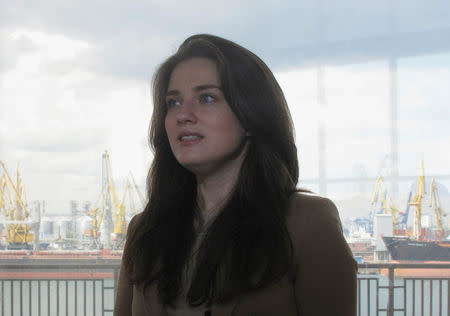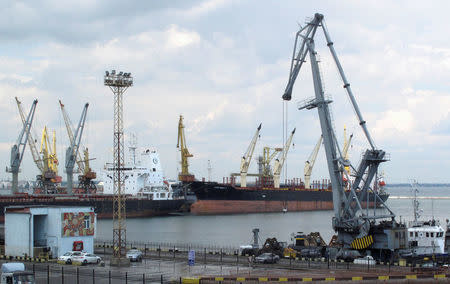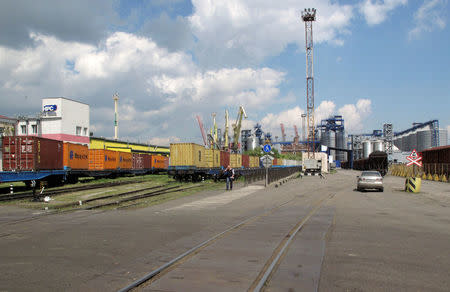How a 26-year-old Ukrainian took on Odessa's customs service
By Matthias Williams ODESSA, Ukraine (Reuters) - The head of customs at the Black Sea port of Odessa says her job used to be such a money-spinner the going bribe for securing it was $5 million. "Everything was completely unpredictable," Yulia Marushevska told Reuters, saying customs staff exploited a lack of clarity over tariffs on goods and the time it took to clear them to extract kickbacks from businesses. A graduate student activist aged just 26, Marushevska was parachuted in to the service seven months ago by President Petro Poroshenko after street protests in 2014 overthrew the country's Russian-backed president. "I talked to officials who worked at the Odessa customs before ... and I heard that the bribe to be a chief of Odessa customs was about 5 million dollars," she said. She did not specify who had paid the bribe, or to whom, and Reuters could not verify her statement. Her account points to a delicate balance of power in Ukraine, the front line in a new cold war between Russia and the West. Marushevska's early reforms, partly funded by U.S. aid money, were stark: "We fired all the heads of the departments," she said, adding that almost all the heads of the checkpoints lost their jobs too. "People from the central office were calling me, asking 'what are you doing? You are destroying the whole system,'". New customs staff are being hired via a competitive process and trained by the United States, which, along with the European Union backs an aid-for-reforms program. Marushevska lists publishing tariffs online and cutting the number of inspections among her achievements but says she almost quit the job in frustration at delays to the introduction of a new computer system and construction of a new headquarters. "It seems like no-one is really interested that this customs reform is happening. I saw that there is no political will," she said. If she leaves, she will be following other reformers, who have either been fired, or, like the former economy minister, resigned complaining their work has been blocked. FACEBOOK BATTLE The customs office employs 1,303 officers and brings in $48 million a month to the budget, Marushevska's office says. Her critics, who include regional officials and her own boss, say that, with no experience in administration, she is not qualified to do the job and has politicized it by continuing to express views she held as a political activist. Marushevska rose to international prominence after a video she appeared in called "I am a Ukrainian" went viral. Against a background of scenes of police clashing with protesters during the 2014 unrest she said her country was no longer part of the Soviet Union and wanted to shake off politicians working only for themselves. She now uses her Facebook page to counter what she says is a campaign to discredit her by state agencies set against change. This month, she publicly accused her boss, Nasirov, of trying to fire her. She posted a letter of complaint from regional officials on Facebook that accused her of politicizing the service and said she thought Nasirov had prompted the officials to send it. Marushevska said Nasirov had sent her three reprimands, enough to fire her, but did not go ahead with the sacking. She also accused Nasirov of trying to block the revamped computerization of the customs system. Reuters was unable to independently verify the accusations and Nasirov's office did not respond to specific questions on them. It did, however, issue a statement saying Marushevska's reforms had made things worse. "This year the situation is extremely unsatisfactory," it said, adding that in the first quarter revenues from Odessa customs had decreased by 30 percent, while in Ukraine as a whole, revenues were up 21 percent. "We see negative results from (Marushevska's) management." Marushevska's office said customs clearance for energy goods had been removed from its oversight and its anti-corruption moves had also had an impact on revenues, since companies using bribes to pay lower duties switched to customs points elsewhere. Marushevska was speaking in a building designated for a new customs area where her newly-hired and U.S. trained officials will deal with businesses directly rather than through brokers. She said the security services (SBU) had sought to sabotage construction of the new terminal, which was halted for a while but restarted after a visit by Ukraine's new Prime Minister Volodymyr Groysman. The SBU's press service did not respond to an emailed request for comment. On March 23, the head of the secret service gave a news conference saying perfume disguised as polyethylene film was allowed to pass through Odessa customs. Fighting back on her Facebook page, Marushevska said the SBU had seized the containers before they cleared customs and the fraud would have been discovered had they remained there. Supporting Marushevska is Mikheil Saakashvili, the former Georgian President who became Governor of the Odessa region last year, picked out by Poroshenko on the strength of his reforms after Georgia's Rose Revolution in 2003. "Nobody took her seriously when she was appointed. Everybody thought it was just a propaganda PR show and she would not reform, it was just for a short period of time. But she has this grit to really change things," he told Reuters. BATTLEFRONT On Marushevska's watch, the time it took for companies to clear customs in Odessa fell to 38 minutes from 4 hours and 48 minutes, her office said. But have things turned out the way she hoped? "No. I really hoped that it would be much faster, much better and with completely different quality of the people working in the government," she said. She does not want a situation where young people entering public service can only "choose between being a corrupt person or someone very poor that cannot survive". Marushevska said she had sought meetings with Poroshenko to try to raise complaints about delays to her reforms, but the meetings were postponed. Poroshenko's press team did not provide comment, but recommended Reuters interview Saakashvili instead. Asked about Poroshenko cancelling meetings, Saakashvili attributed this to the political turmoil in Kiev, where political infighting crippled and then toppled the government earlier this year. "I think there was a very complicated situation," he said. "In many ways this whole thing with the Odessa customs became a big battlefield on the reform front between the old conservatives and people who are trying to reform ... The president is always all the time trying to strike the balance." (Additional reporting by Margaryta Chornokondratenko and Sergei Karazy in ODESSA and Pavel Polityuk and Alessandra Prentice in KIEV; editing by Philippa Fletcher)





